初三英语寒假专题复习四--形容词和副词
初三英语总复习--形容词和副词
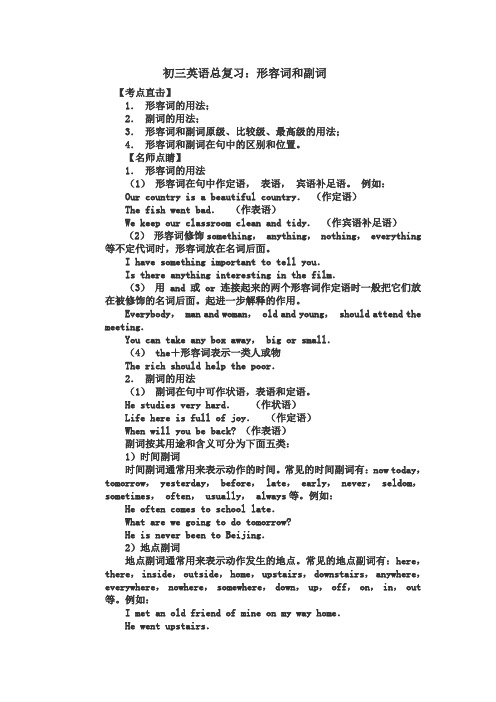
初三英语总复习:形容词和副词【考点直击】1.形容词的用法;2.副词的用法;3.形容词和副词原级、比较级、最高级的用法;4.形容词和副词在句中的区别和位置。
【名师点睛】1.形容词的用法(1)形容词在句中作定语,表语,宾语补足语。
例如:Our country is a beautiful country.(作定语)The fish went bad.(作表语)We keep our classroom clean and tidy.(作宾语补足语)(2)形容词修饰something, anything, nothing, everything 等不定代词时,形容词放在名词后面。
I have something important to tell you.Is there anything interesting in the film.(3)用 and 或 or 连接起来的两个形容词作定语时一般把它们放在被修饰的名词后面。
起进一步解释的作用。
Everybody, man and woman, old and young, should attend the meeting.You can take any box away, big or small.(4) the+形容词表示一类人或物The rich should help the poor.2.副词的用法(1)副词在句中可作状语,表语和定语。
He studies very hard.(作状语)Life here is full of joy.(作定语)When will you be back? (作表语)副词按其用途和含义可分为下面五类:1)时间副词时间副词通常用来表示动作的时间。
常见的时间副词有:now today,tomorrow, yesterday, before, late, early, never, seldom,sometimes, often, usually, always等。
人教版英语初三复习形容词和副词总结

(2)形容词最高级前不加 the 的情况。 如果形容词最高级前有物主代词、指示代词、名词所有格,则不必加 the。如: Monday is my busiest day. 星期一是我最忙的一天。 (3)在同一范围内比较时,必须把主体排除在被比较的范围之外。如: China is larger than any_other country in Asia. 中国比亚洲其他任何一个国家都大。(在同一范围内,只能和其他对象进行比较)。如: China is larger than any country in Africa. 中国比非洲的任何一个国家都大。(在不同范围内,可以和其中任意一个对象进行比较)。
(4)表示“几倍于„„”时,用“倍数+比较级+than”表示。 He is two years younger than you. 他比你小两岁。 (5)表示“两者之间最„„一个(of the two)”时,常用“the+比较级”结构。 Tom is the taller of the two boys. 汤姆是这两个男孩中最高的一个。 (6)表示“越来越„„”,用比较级重叠结构,即“比较级+and+比较级”,多音节词 和部分双音节词时用“more and more+形容词原级”。 It's getting warmer_and_warmer in spring. 春天天气变得越来越暖和。 Our school is becoming more_and_more_beautiful. 我们的学校变得越来越漂亮了。 (7)表示“越„„就越„„”时,用“the +比较级,the+另一比较级”结构。 The_more we get together, the_happier we'll be. 我们越聚在一起就越高兴。
九年级英语专题复习教案:形容词和副词知识讲解

九年级英语专题复习教案:形容词和副词知识讲解一、教学目标:1. 让学生掌握形容词和副词的基本概念和用法。
2. 培养学生正确运用形容词和副词表达事物特征和程度的能力。
3. 提高学生英语写作和口语表达能力。
二、教学内容:1. 形容词和副词的定义及分类。
2. 形容词和副词的位置和用法。
3. 形容词和副词的比较级和最高级。
4. 形容词和副词的搭配和固定短语。
5. 形容词和副词在句子中的功能和作用。
三、教学重点与难点:1. 形容词和副词的分类及用法。
2. 形容词和副词的比较级和最高级的构成和用法。
3. 形容词和副词的搭配和固定短语。
4. 形容词和副词在句子中的功能和作用。
四、教学方法:1. 采用讲解法,讲解形容词和副词的基本概念、分类、用法等。
2. 采用举例法,通过大量例句展示形容词和副词的用法。
3. 采用练习法,让学生通过练习巩固所学知识。
4. 采用互动法,引导学生参与课堂讨论,提高口语表达能力。
五、教学步骤:1. 导入:引导学生复习形容词和副词的基本概念,激发学生兴趣。
2. 讲解:讲解形容词和副词的分类、用法、位置等,让学生明确各类形容词和副词的特点。
3. 举例:通过大量例句展示形容词和副词的用法,让学生加深理解。
4. 练习:设计相关练习题,让学生运用所学知识进行实际操作。
5. 讨论:引导学生就形容词和副词的搭配和固定短语展开讨论,提高口语表达能力。
6. 总结:对本节课的内容进行总结,强调形容词和副词在句子中的功能和作用。
7. 作业:布置课后作业,巩固所学知识。
六、课后作业:1. 复习本节课所学内容,整理笔记。
2. 完成课后练习题,巩固所学知识。
3. 收集形容词和副词的搭配和固定短语,加强实际运用。
七、教学评价:1. 课堂参与度:观察学生在课堂上的发言和讨论情况,评价学生的参与度。
2. 练习完成情况:检查学生课后练习的完成情况,评价学生的掌握程度。
3. 作业质量:评估学生课后作业的完成质量,了解学生的学习效果。
中考英语形容词和副词用法总结
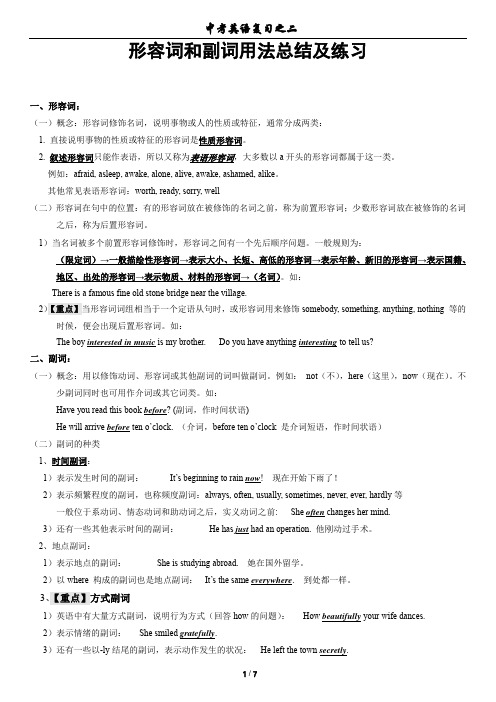
形容词和副词用法总结及练习一、形容词:(一)概念:形容词修饰名词,说明事物或人的性质或特征,通常分成两类:1. 直接说明事物的性质或特征的形容词是性质形容词。
2. 叙述形容词只能作表语,所以又称为表语形容词,大多数以a开头的形容词都属于这一类。
例如:afraid, asleep, awake, alone, alive, awake, ashamed, alike。
其他常见表语形容词:worth, ready, sorry, well(二)形容词在句中的位置:有的形容词放在被修饰的名词之前,称为前置形容词;少数形容词放在被修饰的名词之后,称为后置形容词。
1)当名词被多个前置形容词修饰时,形容词之间有一个先后顺序问题。
一般规则为:(限定词)→一般描绘性形容词→表示大小、长短、高低的形容词→表示年龄、新旧的形容词→表示国籍、地区、出处的形容词→表示物质、材料的形容词→(名词)。
如:There is a famous fine old stone bridge near the village.2)【重点】当形容词词组相当于一个定语从句时,或形容词用来修饰somebody, something, anything, nothing 等的时候,便会出现后置形容词。
如:The boy interested in music is my brother. Do you have anything interesting to tell us?二、副词:(一)概念:用以修饰动词、形容词或其他副词的词叫做副词。
例如:not(不),here(这里),now(现在)。
不少副词同时也可用作介词或其它词类。
如:Have you read this book before? (副词,作时间状语)He will arrive before ten o’clock. (介词,before ten o’clock 是介词短语,作时间状语)(二)副词的种类1、时间副词:1)表示发生时间的副词:It’s beginning to rain now! 现在开始下雨了!2)表示频繁程度的副词,也称频度副词:always, often, usually, sometimes, never, ever, hardly等一般位于系动词、情态动词和助动词之后,实义动词之前: She often changes her mind.3)还有一些其他表示时间的副词:He has just had an operation. 他刚动过手术。
初三下册 英语 中考专项复习形容词、副词
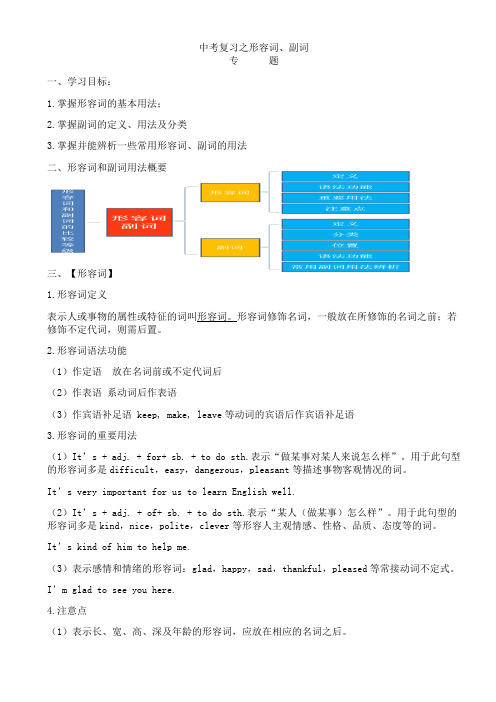
中考复习之形容词、副词专题一、学习目标:1.掌握形容词的基本用法;2.掌握副词的定义、用法及分类3.掌握并能辨析一些常用形容词、副词的用法二、形容词和副词用法概要三、【形容词】1.形容词定义表示人或事物的属性或特征的词叫形容词。
形容词修饰名词,一般放在所修饰的名词之前;若修饰不定代词,则需后置。
2.形容词语法功能(1)作定语放在名词前或不定代词后(2)作表语系动词后作表语(3)作宾语补足语 keep, make, leave等动词的宾语后作宾语补足语3.形容词的重要用法(1)It’s + adj. + for+ sb. + to do sth.表示“做某事对某人来说怎么样”。
用于此句型的形容词多是difficult,easy,dangerous,pleasant等描述事物客观情况的词。
It’s very important for us to learn English well.(2)It’s + adj. + of+ sb. + to do sth.表示“某人(做某事)怎么样”。
用于此句型的形容词多是kind,nice,polite,clever等形容人主观情感、性格、品质、态度等的词。
It’s kind of him to help me.(3)表示感情和情绪的形容词:glad,happy,sad,thankful,pleased等常接动词不定式。
I’m glad to see you here.4.注意点(1)表示长、宽、高、深及年龄的形容词,应放在相应的名词之后。
The river is about two thousand metres long.(2)只能作表语的形容词:afraid害怕;alone独自的;asleep 睡着的;awake醒着的。
The man is ill.(正)The ill man is my uncle.(误)(3)某些形容词加上定冠词可以泛指一类人,与谓语动词的复数连接。
2022年中考英语语法专题之形容词和副词的用法(含练习和答案)
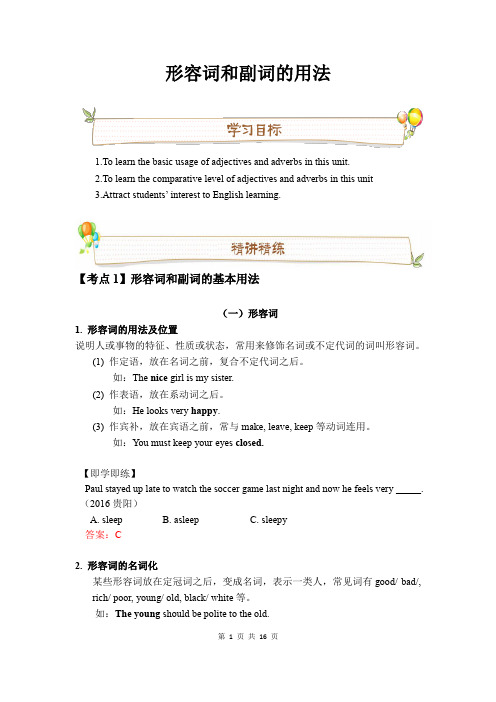
形容词和副词的用法1.To learn the basic usage of adjectives and adverbs in this unit.2.To learn the comparative level of adjectives and adverbs in this unit3.Attract students’ interest to English learning.【考点1】形容词和副词的基本用法(一)形容词1. 形容词的用法及位置说明人或事物的特征、性质或状态,常用来修饰名词或不定代词的词叫形容词。
(1) 作定语,放在名词之前,复合不定代词之后。
如:The nice girl is my sister.(2) 作表语,放在系动词之后。
如:He looks very happy.(3) 作宾补,放在宾语之前,常与make, leave, keep等动词连用。
如:You must keep your eyes closed.【即学即练】Paul stayed up late to watch the soccer game last night and now he feels very _____.(2016贵阳)A. sleepB. asleepC. sleepy答案:C2. 形容词的名词化某些形容词放在定冠词之后,变成名词,表示一类人,常见词有good/ bad/, rich/ poor, young/ old, black/ white等。
如:The young should be polite to the old.3. 形容词的顺序当名词由两个以上的形容词(包括一些具有形容词功能的限定词)修饰时,这些词的顺序通常遵循一定的规则,一般不得随意调换,也不能依照汉语的意思去排列。
通常可按下面的次序排列:(1) 限定词,包括:冠词、指示代词、形容词性物主代词、名词所有格、数词等。
初中英语形容词和副词

例题: 1. She was _____ (luck) to lose her money when she went shopping last weekend. [04西宁] 2. This kind of skirt looks __ and sells__. [04天津] A. nice; well B. nice; good C. well; well D. good; nice
3.某些描述感觉或心情的形容词: glad 高兴的 pleased 高兴的 sorry 难过的 I’m glad to hear that. 听到这消息我很高兴。 You will be sorry about this later. 对这件事你以后会后悔的。 We are very pleased with the plan. 我们对这个计划很满意。 【注】若用于其他意思,则可用作定语,如 glad 表示“(感到)高兴的”时,只用作表语;若表示“令人高兴的”,则只用作定语(glad news 好消息)。
A
A
4).The house smells as if it hasn’t been lived in for years. A. Little white wooden B. little wooden white C. white wooden little D. wooden white little 5). Students are required to take part in the boat race. A. Ten strong young Chinese B. Ten Chinese strong young C. Chinese ten young strong D. Young strong ten Chinese
中考英语专项复习专题【形容词、副词】(附例题以及答案)
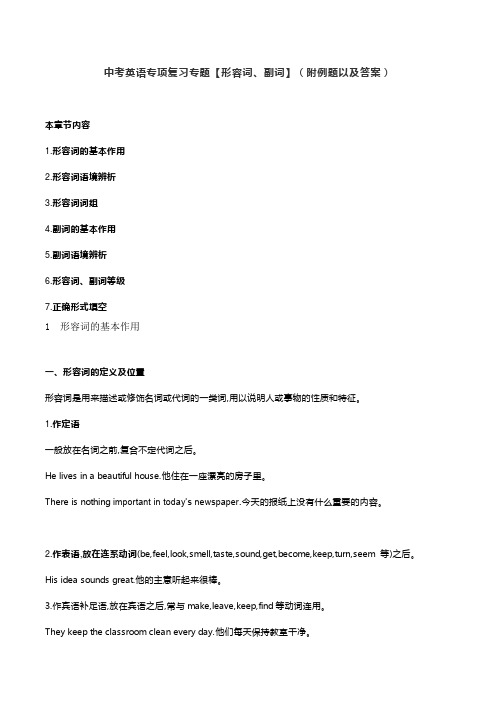
中考英语专项复习专题【形容词、副词】(附例题以及答案)本章节内容1.形容词的基本作用2.形容词语境辨析3.形容词词组4.副词的基本作用5.副词语境辨析6.形容词、副词等级7.正确形式填空1 形容词的基本作用一、形容词的定义及位置形容词是用来描述或修饰名词或代词的一类词,用以说明人或事物的性质和特征。
1.作定语一般放在名词之前,复合不定代词之后。
He lives in a beautiful house.他住在一座漂亮的房子里。
There is nothing important in today’s newspaper.今天的报纸上没有什么重要的内容。
2.作表语,放在连系动词(be,feel,look,smell,taste,sound,get,become,keep,turn,seem 等)之后。
His idea sounds great.他的主意听起来很棒。
3.作宾语补足语,放在宾语之后,常与make,leave,keep,find等动词连用。
They keep the classroom clean every day.他们每天保持教室干净。
We find it important to learn English well.我们发现学好英语很重要。
4.形容词的名词化有些形容词放在定冠词之后变成名词,表示一类人,常见的有:good/bad,rich/poor,young/old,deaf/blind, black/white,living/dead等The old should be taken good care of.老年人应该受到很好的照顾。
2形容词词义辨析rich富有的↔ poor贫穷的happy高兴的↔ angry生气的short短的↔ long长的same相同的↔ different不同的3形容词短语辨析形容词短语在单项填空中考查词义辨析,在词组翻译中考查词义及拼写。
这就要求不仅要知道意思,还要能准确地写出来。
- 1、下载文档前请自行甄别文档内容的完整性,平台不提供额外的编辑、内容补充、找答案等附加服务。
- 2、"仅部分预览"的文档,不可在线预览部分如存在完整性等问题,可反馈申请退款(可完整预览的文档不适用该条件!)。
- 3、如文档侵犯您的权益,请联系客服反馈,我们会尽快为您处理(人工客服工作时间:9:00-18:30)。
戴氏教育语录天下:Do not, for one repulse, forgot the purpose that you resolved to effort.不要只因一次挫败,就放弃你原来决心想达到的目的。
形容词adj.考点一形容词比较级和最高级一、概念形容词是用来修饰名词、代词,说明人或事物的性质、状态和特征的词。
二、形容词的用法及位置1. 作定语,放在名词之前,不定代词之后。
The nice girl is my sister.这个漂亮的女孩是我妹妹。
I have something important to tell you.我有一些重要的事情要告诉你。
2. 作表语,放在系动词之后。
He looks very happy.Our school is big and clean.3. 作宾语补足语,放在宾语之后,常与make, find, leave, keep等使役动词连用。
You must keep your eyes closed.I find it hard to travel around the big city.三、部分形容词特有的后缀形式四、形容词的比较级和最高级绝大多数形容词有三种形式,即原级,比较级和最高级, 用以表示形容词说明的性质在程度上的不同。
三级形式的用法公式:1.形容词原级的特殊用法(1)表示A与B在某方面程度相同或不同时用形容词原级。
①肯定句结构:A+be +as+形容词原级+as+B 。
如:English is as interesting as Chinese.②否定句结构:A+be+not+形容词原级+as+B。
如:This book isn’t so new as that one.(2)表示“A是B的······倍”时,结构:A+be+倍数+as+形容词原级+as+B(二倍:twice,三倍及以上:基数词+times)。
如:Our school is three times as big as theirs.同样,“A是B的一半”为“A+be+half+as+形容词原级+as+B”Her room is half as big than mine.2.形容词比较级的用法(1)两者之间比较时,结构:A+be+比较级+than+B。
如:Lily’s room is bigger than mine.(2)表示“几倍于······”时,结构:A+be+倍数+比较级+than+B。
如;Your room is three times bigger than mine.(3)两者之间进行选择“哪一个更······”时,结构:Which/Who+is+比较级,A or B?Who is taller, Li Ming or Wang Tao?(4)表示“越来越······”时,用比较级and比较级和more and more +形容词比较级。
It’s getting warmer and warmer in spring.Our hometown is becoming more and more beautiful.(5)表示“越······越······”时,用“the+比较级···,the+比较级···”。
如:The more you learn English, the better your English will be.3.形容词最高级的用法(1)三者或三者以上进行比较时,用最高级形式。
结构:the+最高级+名词+in/of Shanghai is the biggest city in China.He is the fastest runner of the three boys.(2)在三者或三者之间进行选择时,用“Which/Who is + the + 最高级,A,B or C?”Which city is the most beautiful, Beijing, Shanghai or Guangzhou?(3)表示“最······的······之一”时,用“one of the+最高级”。
Zhang Jie is one of the most popular singers.(4)形容词最高级前可以加序数词,表示“第几最······”。
The Yellow River is the second longest river in China.(5)形容词最高级前可由物主代词、指示代词、名词所有格等修饰。
如:This is our best lesson today.Those happiest days have gone.副词adv.考点二副词比较级和最高级一、概念及分类副词是主要用来修饰动词、形容词、句子,以说明其时间、地点、程度、方式等意义的词。
副词的分类(主要有八类):二、副词的用法及位置✧副词的用法1. 作状语。
He works hard.(修饰动词)He parked the car very easily.(修饰副词)Unfortunately, he was out.(修饰句子)2.作定语。
Write your name in the place below.The weather today is fine.注:只有时间副词和地点副词可以做定语。
3.作表语。
He is back.She was abroad all last summer.I must be off now.注:作表语的副词多是表位置或状态的,如in, out, on, back, down, up, off, away, upstairs。
4. 作宾语补足语。
Put your dirty socks away, Jim! They are giving out bad smell.We saw her off two days ago.Father kept him in and doing his lessons.(父亲把他关在家里做作业)注:地点副词一般可以做宾语补足语。
✧副词的位置1) 修饰名词时(作定语),放在被修饰词之后The villagers there are busy getting in wheat2) 副词修饰形容词、副词时,副词在前面,而被修饰的词在后面。
It's rather easy, I can do it. 这很容易,我能做到。
He did it quite well. 他做得相当好。
3) 频度副词可放在实义动词的前面,情态动词和第一个助动词之后。
I often help him these days. 这些日子我经常帮助他。
I always remember the day when I first came to this school.我常常记得我第一次来学校的那一天。
You mustn't always help me. 你不能老是帮助我。
The work has never been done. 这份工作永远也做不完。
4) 疑问副词,连接副词,关系副词以及修饰整个句子的副词,通常放在句子(从句)的前面。
When do you study everyday? 你每天什么时间学习?Can you tell me how you did it? 你能告诉我你如何做的吗?First, let me ask you some questions. 先让我来问几个问题。
5) 时间副词和地点副词在一个句中, 地点副词在前面,时间副词在后面。
We went shopping in the supermarket at 9 o'clock yesterday.昨天九点钟我们到超市买东西了.What were you doing in the classroom yesterday afternoon?昨天下午你在教室里干什么?三、副词比较等级的用法副词和形容词一样,也有它的比较级和最高级形式. (可以参考形容词的变换形式)。
1、规则变化(1)单音节和部分双音节副词,在原级的后面加上er,est构成比较级和最高级。
a)直接加er,est :hard harder hardest ;fast faster fastestb)以重读闭音节结尾的,要双写最后一个辅音字母,后加er,est:hot hotter hottest ; fat fatter fattestc)以辅音字母+y结尾的,先把y改为i再加上er,est:easy easier easiest; early earlier earliest(2)两个音节或两个以上的音节的,在原级前加more / most.提示:以词尾-ly 结尾的副词(除early )须用more 和most。
2、不规则变化:【真题演练】【2014黄冈】—Tina, breakfast is ready. Dad cooked it for us.—It can’t have been Father. He ______ early on Sundays.A. always gets upB. often got upC. had got upD. never gets up【2014河南】—Where shall we eat tonight?—Let’s call Harry. He _______ knows the best places to go.A. onlyB. nearlyC. seldomD. always【2014北京】—Which season do you like ______, winter or summer?—Summer.A. wellB. betterC. bestD. the best【2014鄂州】—He was chosen to be a volunteer of the Olympic Games.—Great! No one speaks English _______ him.A. as beautiful asB. as badly asC. worse thanD. better than【2014扬州】—I t’s said that Mo Yan’s speech was wonderful.—That’s true. We clapped our hands _______ many times during his speech yesterday.A. excitedB. excitedlyC. excitingD. excitingly【2014咸宁】—As we know it’s difficult to live in a foreign country.—_______ if you can’t understand the language there.A. ExactlyB. NaturallyC. UsuallyD. Especially【2014长沙】—Oh, it was fantastic! Lily danced so well.—Well, I think Kate danced ______than lily.A. wellB. betterC. best【2014连云港】I could ______ control my feelings at the moment. The song brought back so many childhood memories.A. reallyB. hardlyC. nearlyD. clearly【2014重庆】Lin Fang comes home _______ than before this term. She doesn’t have so many classes in the afternoon.A. earlyB. earlierC. lateD. later【2014安徽】If my friends have any problems, my door is ______ open to them.A. neverB. seldomC. sometimesD. always【2014重庆】I’ll ______ stay at that hotel again. It’s so dirty and noisy.A. reallyB. usuallyC. stillD. never【2014白银】—He is the only one who failed in the math exam.—Really? You mean he studies _______.A. the most carefulB. the least carefulC. the most carefullyD. the least carefully【2014南昌】My sister ______ goes to bed early because she needs a lot of sleep every day.A. alwaysB. sometimesC. hardlyD. never【2014宁波】—Did you go to the cinema last night?—Oh, no. I _______ go to the cinema. The tickets, you know, are too expensive.A. alwaysB. hardlyC. usuallyD. often【2014东营】On March 8th , Flight MH 370 went missing. The news brought great sadness to us, the families of the passengers.A. evenB. onlyC. alsoD. especially【2014天津】We don’t want to speak badly or ______ in front of the class.A. clearlyB. carefullyC. carelesslyD. properly【2014温州】—How often do you go skating?—_______. I can’t skate at all.A. AlwaysB. SometimesC. SeldomD. Never【2014威海】To my surprise, my brother can speak English ______.A. livelyB. perfectlyC. badlyD. friendly【2014滨州】—Excuse me, would you please speak a little more ______?—Sorry, I thought you could follow me.A. sadlyB. quicklyC. politelyD. slowly【2014德州】The basketball match was really fantastic, _______ when Shu-How Lin scored in the last second.A. probablyB. especiallyC. exactlyD. mostly【2014聊城】It’s dark. I can’t see the words on the blackboard _______.A. carefullyB. clearlyC. silentlyD. patiently【2014临沂】We are happy to see our city is developing _______ these years than before. A. quickly B. the most quickly C. very quickly D. more quickly【课后练习】一、单项选择题。
